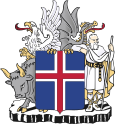 |
|---|
Parliamentary elections were held in Iceland in September 1900. [1]
 |
|---|
Parliamentary elections were held in Iceland in September 1900. [1]
The 30 elected members of the Althing were elected from single or double member constituencies by a three-round system; in the first two rounds, a candidate receiving a majority of the vote was elected; if seats were still unfilled after the second round, a third round was held using first-past-the-post voting. [2] Voting took place at a single polling place in each constituency and was done publicly. [2] A further six members were appointed to the upper house by the Danish monarch. [3]
Suffrage was limited to men aged 25 or over who were not in receipt of poor relief and who met one of several set requirements including being a civil servant, being a graduate of a university or seminary, or meeting various tax criteria (for farmers, paying more than the minimum tax; for burghers or fishermen, paying eight króna of local taxes; for property owners, paying twelve króna of local property taxes). [3] This limited the number of voters to 7,329 from a population of 78,203. [4]
3,573 of the 7,329 registered voters participated in the elections. [4]